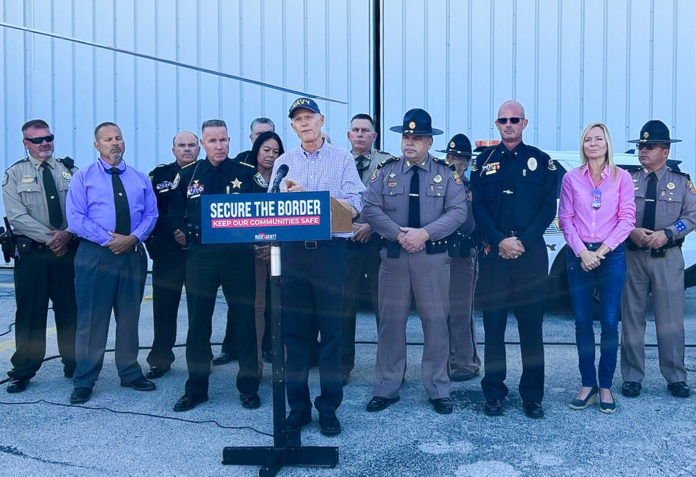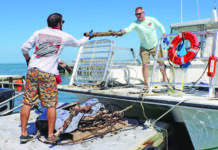
Amid an explosion in migrant landings in the Florida Keys to begin the new year, Marathon received a visit from U.S. Sen. Rick Scott on Jan. 19 for a press conference regarding the ongoing border security crises affecting South Florida communities.
Scott’s appearance at the Marathon airport was preceded by a briefing from U.S. Coast Guard Rear Admiral Brendan McPherson, Monroe County Sheriff Rick Ramsay and Customs and Border Protection’s (CBP) Air and Marine Operations regarding the current situation and local response to the extreme migrant influx in recent weeks. The senator’s visit also included a boat tour earlier in the day to view dozens of migrant vessels dotting the Keys’ shorelines.
“The Biden administration has got to be clear that we’re going to enforce our immigration laws, we’re going to enforce our asylum laws, we’re going to secure our borders,” Scott told reporters.
“What I heard and saw during my briefing and tour … makes me furious and is absolutely heartbreaking. Our brave law enforcement officers … are doing everything they can to keep our communities safe, but this administration has completely abandoned them.”
Scott’s conference joined a chorus of requests from local, state and federal leaders for a stronger response to the record landings. In fiscal year 2022, Coast Guard crews interdicted a record 6,182 Cuban migrants before reaching shore. They are already on pace to smash that record in less than six months, with 4,881 migrants interdicted from Oct. 1, 2022 to Jan. 4.
On Jan. 6, Florida Gov. Ron DeSantis issued a 60-day state of emergency and signed Executive Order 23-03, activating the Florida National Guard and other agencies to provide resources in support of local governments responding to the migrant spike.
Scott’s press conference comes on the heels of an influx of equipment and personnel in recent weeks from multiple military and law enforcement agencies, including the U.S. Coast Guard, Customs and Border Protection, FWC Law Enforcement, Florida Highway Patrol, the Florida Department of Law Enforcement and the Florida National Guard.
On Jan. 5, President Joe Biden announced a new U.S. policy that will accept 30,000 migrants per month from Cuba, Haiti, Nicaragua and Venezuela. The program is a pivot away from previous policies that would allow migrants who reached land to stay in the country as they waited for asylum hearings – a wait currently averaging 4.3 years, as reported by CNN on Dec. 26.
As of the same date, nearly 1.6 million asylum applications were currently pending – the largest number ever on record, according to an analysis of federal data by the Transactional Records Access Clearinghouse at Syracuse University.
“Do not just show up at the border. Stay where you are and apply legally from there,” Biden said. “Starting today, if you don’t apply through the legal process you will not be eligible for this new parole program.”
“We want to send a message out to these third-world countries about the changes in the policy now, which no longer allows you to come here and be released,” Ramsay said in the press conference. “You’re going to be put in secure detention until you’re sent back to your home country. We want those people to know that before they try to come here, so they can make that decision whether it’s worthwhile.”






















